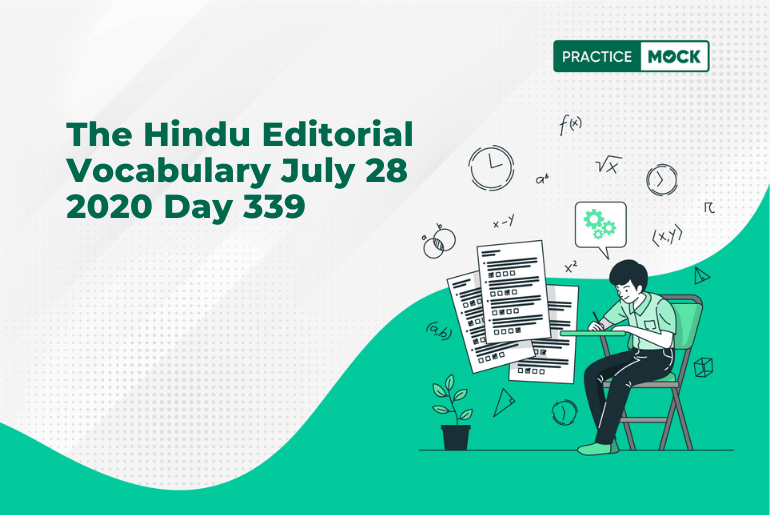Hindu Editorial Vocabulary July 28, 2020: The Hindu Editorial on July 28, 2020, offers a rich tapestry of vocabulary that serves as a linguistic goldmine for aspirants seeking to enhance their language skills. Delve into this treasure trove to bolster your command over English language nuances.
Strategic Vocabulary Acquisition:
Crafting a robust vocabulary requires a strategic approach. Begin by identifying key words in the editorial and understanding their contextual usage. Embrace words that align with your reading preferences and academic or professional pursuits.
Contextual Exploration:
Each word in The Hindu Editorial is a linguistic gem with a unique contextual facet. Explore the editorial’s narrative to understand how these words seamlessly integrate into the broader linguistic landscape, giving you a nuanced understanding of their usage.
Synonyms and Antonyms Exploration:
For a comprehensive grasp, go beyond mere definitions. Explore synonyms and antonyms of the identified words. This not only broadens your vocabulary but also enhances your ability to express ideas with precision.
Application in Sentences:
Mere memorization is insufficient; true mastery comes from practical application. Construct sentences using the newly acquired words. This exercise not only reinforces your understanding but also aids in incorporating these words into your everyday communication.
Building Word Associations:
Connect words with similar meanings or thematic links. Building word associations creates a mental network that makes it easier to recall and apply vocabulary. This cognitive linking strengthens your overall language proficiency.
Regular Review and Reinforcement:
Consistency is key to vocabulary retention. Schedule regular reviews of the words you’ve encountered. Reinforce your learning through periodic revisits, ensuring a deep-rooted and lasting understanding.
Interactive Learning Platforms:
Engage with online platforms or vocabulary apps that provide interactive quizzes and exercises. These platforms offer a dynamic learning environment, making the process enjoyable and facilitating continuous improvement.
Group Discussions and Debates:
Take your vocabulary for a test drive by participating in group discussions or debates. Applying your knowledge in real-time conversations sharpens your language skills and boosts your confidence.
Cultivating a Reading Habit:
Sustained vocabulary enhancement is closely tied to a consistent reading habit. Immerse yourself in diverse genres, exposing yourself to varied vocabulary. This habit not only aids vocabulary growth but also contributes to overall language fluency.
Conclusion:
The Hindu Editorial Vocabulary on July 28, 2020, serves as a linguistic compass, guiding aspirants toward lexical excellence. Embrace a systematic approach, from understanding contexts to practical application, and witness your vocabulary flourish into a powerful tool for effective communication.
The Hindu Editorial on July 28, 2020, offers a rich tapestry of vocabulary that serves as a linguistic goldmine for aspirants seeking to enhance their language skills. Delve into this treasure trove to bolster your command over English language nuances.
Strategic Vocabulary Acquisition:
Crafting a robust vocabulary requires a strategic approach. Begin by identifying key words in the editorial and understanding their contextual usage. Embrace words that align with your reading preferences and academic or professional pursuits.
Contextual Exploration:
Each word in The Hindu Editorial is a linguistic gem with a unique contextual facet. Explore the editorial’s narrative to understand how these words seamlessly integrate into the broader linguistic landscape, giving you a nuanced understanding of their usage.
Synonyms and Antonyms Exploration:
For a comprehensive grasp, go beyond mere definitions. Explore synonyms and antonyms of the identified words. This not only broadens your vocabulary but also enhances your ability to express ideas with precision.
Application in Sentences:
Mere memorization is insufficient; true mastery comes from practical application. Construct sentences using the newly acquired words. This exercise not only reinforces your understanding but also aids in incorporating these words into your everyday communication.
Building Word Associations:
Connect words with similar meanings or thematic links. Building word associations creates a mental network that makes it easier to recall and apply vocabulary. This cognitive linking strengthens your overall language proficiency.
Regular Review and Reinforcement:
Consistency is key to vocabulary retention. Schedule regular reviews of the words you’ve encountered. Reinforce your learning through periodic revisits, ensuring a deep-rooted and lasting understanding.
Interactive Learning Platforms:
Engage with online platforms or vocabulary apps that provide interactive quizzes and exercises. These platforms offer a dynamic learning environment, making the process enjoyable and facilitating continuous improvement.
Group Discussions and Debates:
Take your vocabulary for a test drive by participating in group discussions or debates. Applying your knowledge in real-time conversations sharpens your language skills and boosts your confidence.
Cultivating a Reading Habit:
Sustained vocabulary enhancement is closely tied to a consistent reading habit. Immerse yourself in diverse genres, exposing yourself to varied vocabulary. This habit not only aids vocabulary growth but also contributes to overall language fluency.
Conclusion:
The Hindu Editorial Vocabulary on July 28, 2020, serves as a linguistic compass, guiding aspirants toward lexical excellence. Embrace a systematic approach, from understanding contexts to practical application, and witness your vocabulary flourish into a powerful tool for effective communication.
- Sign Up on Practicemock for Updated Current Affairs, Topic Tests and Mini Mocks
- Sign Up Here to Download Free Study Material
Free Mock Tests for the Upcoming Exams
- IBPS PO Free Mock Test
- RBI Grade B Free Mock Test
- IBPS SO Free Mock Test
- NABARD Grade A Free Mock Test
- SSC CGL Free Mock Test
- IBPS Clerk Free Mock Test
- IBPS RRB PO Free Mock Test
- IBPS RRB Clerk Free Mock Test
- RRB NTPC Free Mock Test
- SSC MTS Free Mock Test
- SSC Stenographer Free Mock Test
- GATE Mechanical Free Mock Test
- GATE Civil Free Mock Test
- RRB ALP Free Mock Test
- SSC CPO Free Mock Test
- AFCAT Free Mock Test
- SEBI Grade A Free Mock Test
- IFSCA Grade A Free Mock Test
- RRB JE Free Mock Test
- Free Banking Live Test
- Free SSC Live Test


